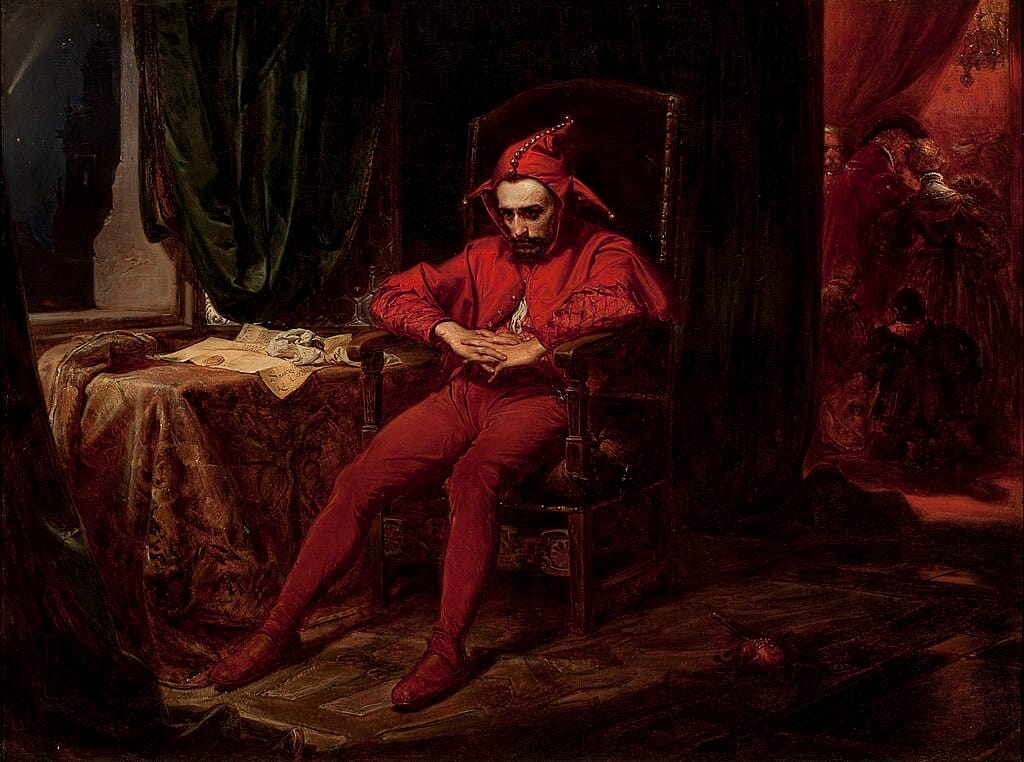The Reason and Round Table

See better, sirrah,
for a name never did make a King.
Because your father called you Arthur,
and fudged the numbers
to make your red blood blue,
there’s Divine Rights to go around —
a Crown for me, and one for you.
Yes, there’s Royalty to spare
and your poor Fool intends to use it.
Don’t forget, my Lord,
I was your kinsman soldier once.
Remember us, I will see to it.
Do you forget, or are we both mad now?
Driven to the wilds of the mind
dancing together in the storm
or sleeping in a hovel wild.
Look into my eyes, see they are still mild.
Look — my heart!
On my sleeve I’ve always worn it.
I see you here, at our feast.
A beast sits upon the throne
when you leave to dance.
Cruel empty air is cold and deep
which all hands reach to snatch and keep.
But to snatch — I know you, friend,
are not the godly man you preach,
your crown is made of gold
and jewels, like eyes, that speak for you —
to snatch you away from reason
and usurp the blue-blood breath
from your Royal lungs.
Do you see them? Your Lords and Admirals?
I do.
Do you hear them
telling their true lies
with double-tongues
you hear their praises
raise them high
the patrons of the Kingdom sigh
with wanton spirits
and tragedy in sight
they want your blood
no matter the colour
and false trust is a blight —
But I know my place, here at your elbow.
My Lord, I have come to love you so.
I would choose to die of old age yet.
A grave is not a promise to forget.
Inspiration
This piece was inspired by the painting at the top, ‘Stańczyk during a ball at the court of Queen Bona in the face of the loss of Smolensk’ by Jan Matejko (1862). I imagined the meditations of the jester driven to the point of desperation, as he appeals to his King to examine his so-called ‘allies.’
Some lines reference Shakespeare’s King Lear, (‘see better’, the hovel and the storm, the two crowns, which are really two halves of an egg shell) in which the role of the Fool mirrors the King’s descent into madness. The Fool’s affection for Lear leads to several attempts to make him understand his mental and political state, but he vanishes right before a war breaks out. The voice of reason is absent in a tyrannical state.
The role of the Fool in the Royal Court was important, as he (or she) often had the right to speak freely before the King, advising him through jokes to rethink his choices, and delivering ideas of the general opinion towards him. My Fool is reprimanded at the end, and claims he would choose to ‘die of old age,’ a reference to one of the most famous Royal Fools, Lord Minimus, a dwarf who was sentenced by King Henry VIII to death for his criticisms. The King loved him so much that he allowed him to choose how he died, and he chose ‘old age’ which saved his life.
When mentioning his own death, my Fool finishes by warning the King of his own impending death at the hands of his ‘Round Table.’ This alludes to Arthurian Legend, and the fact that just because the King bears the name of King Arthur, it does not mean he will survive to become a legend like him. ‘Arthur’ here refers to the first son of King Henry VII who sought to consolidate his rule as a usurper by claiming his descent from King Arthur. He had a relatively peaceful rule, but his son’s infamous one proved that loyalties were not set in stone for anyone.
This poem aims to explore the emotions of someone who genuinely cares for a King, who is unable to speak his mind truly, and is forced to watch the monarch’s descent into tyranny and demise at the hands of malicious nobility.